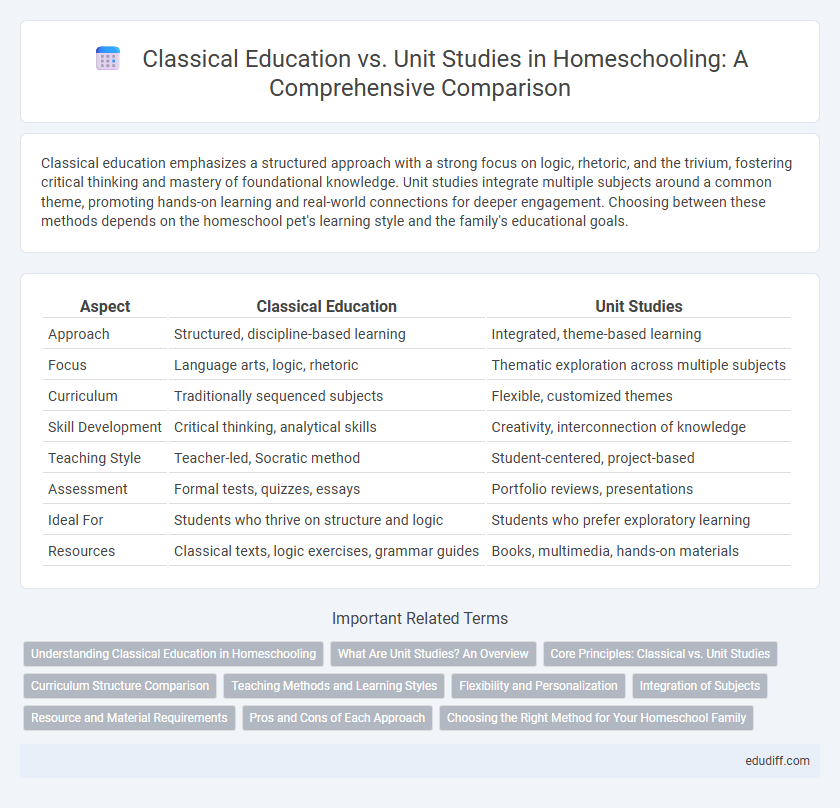Classical education emphasizes a structured approach with a strong focus on logic, rhetoric, and the trivium, fostering critical thinking and mastery of foundational knowledge. Unit studies integrate multiple subjects around a common theme, promoting hands-on learning and real-world connections for deeper engagement. Choosing between these methods depends on the homeschool pet's learning style and the family's educational goals.
Table of Comparison
| Aspect | Classical Education | Unit Studies |
|---|---|---|
| Approach | Structured, discipline-based learning | Integrated, theme-based learning |
| Focus | Language arts, logic, rhetoric | Thematic exploration across multiple subjects |
| Curriculum | Traditionally sequenced subjects | Flexible, customized themes |
| Skill Development | Critical thinking, analytical skills | Creativity, interconnection of knowledge |
| Teaching Style | Teacher-led, Socratic method | Student-centered, project-based |
| Assessment | Formal tests, quizzes, essays | Portfolio reviews, presentations |
| Ideal For | Students who thrive on structure and logic | Students who prefer exploratory learning |
| Resources | Classical texts, logic exercises, grammar guides | Books, multimedia, hands-on materials |
Understanding Classical Education in Homeschooling
Classical education in homeschooling emphasizes a structured approach based on the trivium--grammar, logic, and rhetoric--developing critical thinking and communication skills through language, history, and philosophy. This method contrasts with unit studies, which integrate multiple subjects around a single theme to foster cross-disciplinary connections and hands-on learning. Understanding classical education in homeschooling reveals its focus on foundational knowledge and intellectual rigor tailored to student developmental stages.
What Are Unit Studies? An Overview
Unit studies integrate multiple subjects around a central theme, promoting interdisciplinary learning and deeper understanding by connecting concepts in history, science, literature, and art. This method encourages hands-on activities and creativity, making it ideal for diverse learning styles and fostering critical thinking skills. Unlike classical education, which emphasizes structured memorization and Socratic dialogue, unit studies offer flexible, student-led exploration within cohesive thematic units.
Core Principles: Classical vs. Unit Studies
Classical education emphasizes a structured framework grounded in the Trivium--grammar, logic, and rhetoric--fostering critical thinking and mastery of foundational knowledge. Unit studies integrate multiple subjects around a central theme, promoting hands-on learning and interdisciplinary connections tailored to student interests. Core principles of classical education prioritize sequential intellectual development, whereas unit studies focus on holistic, theme-based exploration.
Curriculum Structure Comparison
Classical education follows a structured, chronological curriculum emphasizing the Trivium stages--grammar, logic, and rhetoric--designed to build critical thinking and language skills sequentially. Unit studies integrate multiple subjects around a central theme, allowing for flexible, interdisciplinary learning that adapts to children's interests and pace. Curriculum structure in classical education is systematic and cumulative, while unit studies promote thematic, hands-on exploration fostering creativity and real-world connections.
Teaching Methods and Learning Styles
Classical education employs a structured, rigorous approach using the Trivium--grammar, logic, and rhetoric stages--catering to analytical and sequential learners. Unit studies integrate multiple subjects around a central theme, appealing to kinesthetic and holistic learners who thrive on thematic, hands-on experiences. Both methods provide adaptive frameworks but differ in pacing and emphasis, aligning with varied cognitive preferences in homeschool settings.
Flexibility and Personalization
Classical education in homeschooling emphasizes a structured curriculum based on the trivium, promoting rigorous intellectual development through logic, grammar, and rhetoric stages. Unit studies offer greater flexibility, allowing families to integrate multiple subjects around a central theme tailored to the child's interests and learning pace. Personalization in unit studies supports diverse learning styles and encourages creative exploration, while classical education provides a consistent framework that fosters critical thinking and mastery of foundational knowledge.
Integration of Subjects
Classical education emphasizes a structured integration of subjects through the trivium, fostering critical thinking by connecting language arts, history, and logic. Unit studies approach integration by immersing students in a single theme, blending multiple subjects like science, math, and literature around a central topic. Both methods encourage interdisciplinary learning but differ in structure and thematic focus.
Resource and Material Requirements
Classical education requires extensive resources, including primary source texts, logic and rhetoric books, and access to language materials like Latin and Greek dictionaries to support its rigorous and structured curriculum. Unit studies demand a diverse range of materials tailored to specific themes, integrating subjects such as science, history, and art, often necessitating hands-on resources, multimedia content, and varied literature to enhance interdisciplinary learning. Both methods call for carefully selected educational tools but differ significantly in scope and specificity of materials needed for effective homeschooling.
Pros and Cons of Each Approach
Classical education emphasizes rigorous memorization, logic, and critical thinking through a structured Trivium model, fostering deep understanding but requiring disciplined schedules and teacher expertise. Unit studies integrate multiple subjects around a central theme, promoting interdisciplinary learning and creativity yet potentially lacking in systematic skill progression and standardized benchmarks. Choosing between these approaches depends on balancing the desire for academic rigor with flexibility and personalized learning preferences in a homeschool environment.
Choosing the Right Method for Your Homeschool Family
Classical education emphasizes a structured, grammar-logic-rhetoric approach fostering critical thinking and mastery of foundational knowledge, ideal for families seeking a rigorous academic framework. Unit studies integrate multiple subjects around a central theme, promoting hands-on learning and flexibility, which suits families desiring a more creative and adaptable curriculum. Evaluating your child's learning style, family schedule, and educational goals helps determine whether the discipline of classical education or the thematic unity of unit studies best supports your homeschool success.
Classical Education vs Unit Studies Infographic

 edudiff.com
edudiff.com